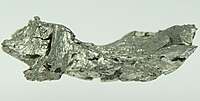
Photo from wikipedia
Osteoarthritis (OA) is the most common degenerative joint disease characterized by enzymatic degradation of the cartilage extracellular matrix (ECM) causing joint pain and disability. There is no disease-modifying drug available… Click to show full abstract
Osteoarthritis (OA) is the most common degenerative joint disease characterized by enzymatic degradation of the cartilage extracellular matrix (ECM) causing joint pain and disability. There is no disease-modifying drug available for the treatment of OA. An ideal drug is expected to stop cartilage ECM degradation and restore the degenerated ECM. The ECM primarily contains type II collagen and aggrecan but also has minor quantities of other collagen fibers and proteoglycans. In OA joints, the components of the cartilage ECM are degraded by matrix-degrading proteases and hydrolases which are produced by chondrocytes and synoviocytes. Matrix metalloproteinase-13 (MMP-13) and a disintegrin and metalloproteinase with thrombospondin motifs 4 and 5 (ADAMTS5) are the major collagenase and aggrecanase, respectively, which are highly expressed in OA cartilage and promote cartilage ECM degradation. Current studies using various in vitro and in vivo approaches show that natural compounds inhibit the expression and activity of MMP-13, ADAMTS4, and ADAMTS5 and increase the expression of ECM components. In this review, we have summarized recent advancements in OA research with a focus on natural compounds as potential therapeutics for the treatment of OA with emphasis on the prevention of cartilage ECM degradation and improvement of joint health.
Journal Title: Life
Year Published: 2022
Link to full text (if available)
Share on Social Media: Sign Up to like & get
recommendations!